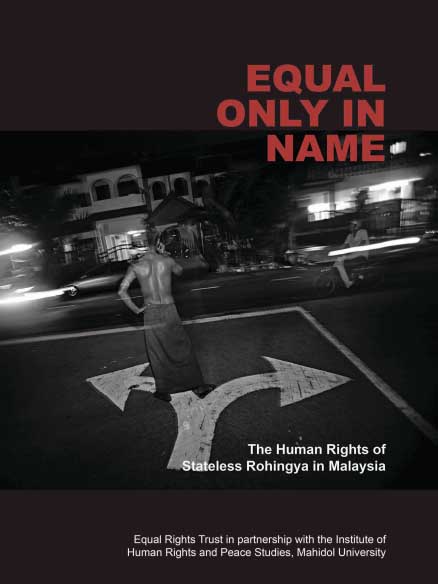Equal Only in Name: the Human Rights of Stateless Rohingya in Malaysia
By Equal Rights Trust and Institute for Human Rights and Peace Studies Mahidol University • October 17, 2014 Two important new reports on discrimination against stateless Rohingya in Malaysia and Thailand were launched today by the Equal Rights Trust in partnership with the Institute for Human Rights and Peace Studies Mahidol University, Bangkok (IHRP).
Two important new reports on discrimination against stateless Rohingya in Malaysia and Thailand were launched today by the Equal Rights Trust in partnership with the Institute for Human Rights and Peace Studies Mahidol University, Bangkok (IHRP).
Direct testimonies in the reports – Equal Only in Name: the Human Rights of Stateless Rohingya in Malaysia and Equal Only in Name: the Human Rights of Stateless Rohingya in Thailand – range from Rohingya children being unable to access education because their births were not registered to Rohingya women and children being detained and starved and men tortured and beaten while being trafficked.
In addition to such testimonies from Rohingya discriminated against on the grounds of their ethnicity, race, religion, national or social origin and stateless status, the reports, which are the result of more than three years of in-depth research, analysis and field work by a multi-disciplinary international team, include interviews with key government officials that offer fresh insight into how the Rohingya issue is viewed and responded to by each state.
“We identified layers of discrimination ranging from acute racially and religiously motivated discrimination and persecution Rohingya suffer in Myanmar to the more subtle discrimination on the grounds of their statelessness and lack of legal status in Malaysia and Thailand,” said Dr Dimitrina Petrova, Executive Director of the Equal Rights Trust.
“The impact of this discrimination on their enjoyment of human rights is devastating and all-encompassing. The resultant vulnerability, insecurity and disadvantage of the Rohingya will continue into the next generation and onto new lands, unless action is taken now.” Petrova added.
Expanding on this, a Rohingya community leader said: “Thousands of victims who have abandoned their home towns in Arakan in order to escape persecution fall in the hands of human traffickers. They load a big number of people on to small boats. People in the boats have to stay for 20 to 30 days in a squatting position and they cannot move freely. The brokers never provide sufficient food and drinks to the boat people. On top of this people who ask for food or drinks or try to move in the boat are severely beaten by the traffickers. As a result many people get sick, some cannot walk, and some even become paralysed.”
The reports further illustrate how the non-existence of adequate protection mechanisms for refugees and stateless persons, the resultant treatment of Rohingya refugees as “illegal” migrants, and their consequent lack of legal status in both Malaysia and Thailand, is central to the discrimination they face in accessing all human rights. The reports also establish that the statelessness and irregular status of Rohingya children born in Malaysia and Thailand can be resolved through universal birth registration, regularisation and ultimately, granting them nationality.
In response, the Equal Rights Trust and IHRP call on Malaysia and Thailand to recognise that Rohingya – as stateless refugees fleeing persecution in Myanmar – are entitled to comprehensive protection under international human rights and humanitarian law. This includes ensuring that they are able to enjoy fundamental human rights such as the right to education, healthcare and liberty and security of the person on an equal basis with others.
In particular they recommend that:
- Malaysia and Thailand strengthen the substance and implementation of their legal frameworks, including through acceding to the 1951 Refugee Convention, the 1954 and 1961 Statelessness Conventions and all relevant human rights treaties, amending national laws to bring them into compliance with international standards and implementing existing laws and policies in a non-discriminatory way.
- Malaysia and Thailand adopt comprehensive equality legislation and policies to give effect to the rights to equality and non-discrimination, covering non-citizens as well as citizens.
- Malaysia and Thailand take leadership roles in a regional response to ensure that the human rights protection of the Rohingya is prioritised and addressed.
- Malaysia and Thailand protect Rohingya children and always act in the best interests of the child, including through granting them equal access to education and healthcare, ensuring they benefit from universal birth registration, legal stay rights and that their right to a nationality is fulfilled.
The reports are an output of a multi-year, multi-country research and advocacy project on the human rights of stateless Rohingya. Their publication will be followed by that of future reports on the human rights of the Rohingya in Bangladesh, Myanmar and Saudi Arabia.
To read Equal Only in Name: the Human Rights of Stateless Rohingya in Malaysia, click here.
To read Equal Only in Name: the Human Rights of Stateless Rohingya in Thailand, click here.
Tags: Equal Rights Trust, Institute for Human Rights and Peace Studies Mahidol Univeristy, Malaysia, Rohingya, Stateless, ThailandThis post is in: Human Trafficking
Related PostsEqual Only in Name: the Human Rights of Stateless Rohingya in Thailand
Equal Rights Trust Publishes Two Reports on Stateless Rohingya Refugees in Malaysia and Thailand









 All posts
All posts